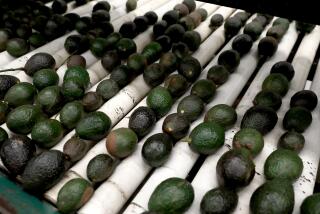U.S.-Mexico tomato fight puts jobs, prices on the line
MEXICO CITY — Mexico and the United States are gearing for a costly showdown over fresh tomatoes — a $3.5-billion business for the two countries — in a move that could boost the fortunes of some American tomato farmers but raise prices for U.S. consumers.
Growers in Florida have demanded cuts in imports from Mexico, and Washington appears inclined to support the Floridians and the few farmers from other states who have joined the complaint.
That would require ending a 16-year-old trade agreement and endanger tens of thousands of jobs on both sides of the border, especially in California and other border states, advocates for the Mexican tomatoes say.
It also would probably increase the cost to U.S. consumers of fresh tomatoes, though it’s unclear by how much. Mexico provides the United States with about half the fresh tomatoes it consumes, and many of the rest are grown in Florida, the United States’ No. 1 producer of fresh tomatoes, followed closely by California. (The Golden State surpasses Florida when processed tomatoes are thrown into the mix.)
In the last decade, Mexican growers have ramped up fresh tomato production. In 2000, fresh tomato exports totaled $412 million; in 2011, that figure jumped to $1.81 billion.
U.S. importers of the Mexican varieties say they are tastier, cheaper and more plentiful year-round. The Florida growers contend Mexico low-balls its prices and makes fair competition impossible, and they asked the U.S. Commerce Department to intervene.
Late last week, the department filed notice of intent to grant the Florida growers’ petition, a move that will allow them to formally accuse Mexican producers of illegal dumping. The decision, though preliminary, infuriated Mexico and a host of U.S. companies supporting the Mexican tomato, including major grocery and restaurant chains and California importers.
“We are very disappointed,” said Francisco de Rosenzweig, Mexico’s top foreign trade official. He said Mexican producers were especially stunned because the Commerce decision, announced Thursday, came one day before an initial meeting the two sides were to have to discuss renegotiating the trade agreement.
There are fears of a wider trade war if Mexico retaliates by trying to restrict the tons of U.S. meat, poultry, grains or other agricultural products that Mexico buys. Mexico is the United States’ largest destination for exports overall, after Canada.
De Rosenzweig did not rule out reprisals. “This is a time we need more commerce, not less, since less hurts jobs and economic recovery,” he said.
Many in the pro-Mexican tomato camp suspect presidential election politics have had a role in the dispute, with the Floridians using their state’s status as a repository of swing votes to put pressure on the Obama administration.
The Florida lobbyists have been pressing for an early decision from Commerce that would come before the U.S. election next month; normally, the review procedure in this type of action takes nine months. But they say the reason for the haste is that growers need to make decisions now for the next planting season.
Mexico is blessed with lower labor costs, good weather and rich soil, and tomatoes are its largest legal agricultural export. The growth in sales of fresh Mexican tomatoes to the U.S. has contributed to a thriving industry that employs 350,000 people in Mexico. At current production rates, Mexican earnings were on course to top $2 billion this year.
Some parts of Mexico, like the fertile, greenhouse-dotted Sinaloa region on the west coast, are so dedicated to the crop that the tomato is the symbol on the state license plate.
Mexican production got a huge push in the years after World War II when American businessmen were looking for ways to provide fresh vegetables to U.S. consumers.
Total U.S. production of fresh market tomatoes was valued at $1.3 billion in 2009, the most recent data available.
Last week’s preliminary ruling was to suspend a pact between Mexican growers and the U.S. Commerce Department, in force since 1996, that sets prices for fresh tomato imports and was meant to guarantee fair trade. Interested parties now have 40 days to file objections.
“If they do this, it will be devastating for the [U.S.] importing industry and for the Mexican tomato exporting industry,” said Lance Jungmeyer, president of the Fresh Produce Assn. of the Americas, an Arizona-based trade group that promotes the U.S. import of produce from Mexico.
“If they [Florida growers] can put protection measures on Mexican tomatoes, they will corner the market for themselves.”
Jungmeyer contends that Mexican techniques and practices have evolved over the years to produce a superior tomato. Mexican farmers harvest vine-ripened tomatoes while many Floridians still pick tomatoes while green, then zap them with ethylene gas to turn them red. The Florida fruit is uniform in color and appearance but less flavorful than the Mexican version, Jungmeyer said.
Siding with him were numerous U.S. agricultural and retail organizations including the National Restaurant Assn. and Wal-Mart.
“A potential trade disruption with Mexico could have a devastating impact on U.S. farmers, manufacturers, and service providers and their employees who collectively export hundreds of billions of dollars in goods and services annually to Mexico,” the U.S. Chamber of Commerce wrote in a letter last month to acting Commerce Secretary Rebecca Blank.
The Florida growers, meanwhile, had their own booster club, including a bipartisan group of Florida legislators, who said in letters to Blank that the “predatory actions” of Mexican tomato growers were hurting domestic production. A similarly bipartisan group of Arizonans, led by Republican Sen. John McCain, backed the Mexican tomato.
The Floridians welcomed the Commerce move.
The “preliminary decision is welcome news to domestic growers and the workers who have suffered under an outdated and failed agreement governing trade in fresh tomatoes with Mexico,” Reggie Brown, executive director of the Florida Tomato Exchange, said in a statement.
Some California growers also lauded the move.
Donna Vaughan, a stakeholder in Live Oak Farms, a tomato grower in Merced County, said her firm had found itself competing against Mexican growers in recent years and that it was losing. Mexican growers have ramped up production in summer months, cutting into California’s tomato growing season.
“It’s been difficult to compete,” she said. “If the playing field was fair, I’d have no issues. But the playing field doesn’t seem to be fair.”
The 1996 agreement that the Commerce decision would scrap grew out of the 1994 North American Free Trade Agreement, which opened the door to more abundant tomato exports to the U.S. from Mexico by eliminating tariffs. NAFTA also set up mechanisms for settling the many trade disputes that followed, and this latest spat over the tomato may yet end up being resolved that way.
Wilkinson reported from Mexico City and Lopez from Los Angeles. Times staff writer Dalina Castellanos in Los Angeles contributed to this report.








